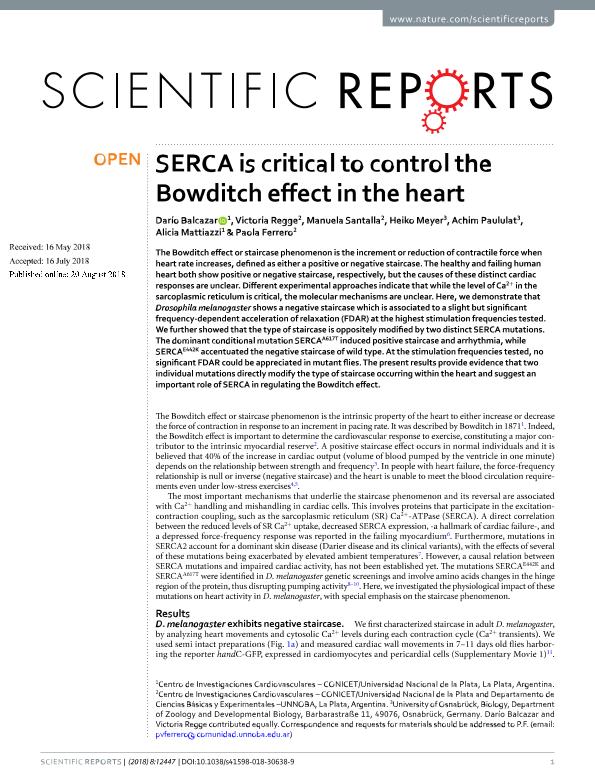Mostrar el registro sencillo del ítem
dc.contributor.author
Balcazar, Dario Emmanuel

dc.contributor.author
Regge, María Victoria

dc.contributor.author
Santalla, Manuela

dc.contributor.author
Meyer, Heiko
dc.contributor.author
Paululat, Achim

dc.contributor.author
Mattiazzi, Ramona Alicia

dc.contributor.author
Ferrero, Paola Viviana

dc.date.available
2020-01-31T15:03:50Z
dc.date.issued
2018-12
dc.identifier.citation
Balcazar, Dario Emmanuel; Regge, María Victoria; Santalla, Manuela; Meyer, Heiko; Paululat, Achim; et al.; SERCA is critical to control the Bowditch effect in the heart; Nature Publishing Group; Scientific Reports; 8; 12447; 12-2018; 1-8
dc.identifier.issn
2045-2322
dc.identifier.uri
http://hdl.handle.net/11336/96370
dc.description.abstract
The Bowditch effect or staircase phenomenon is the increment or reduction of contractile force when heart rate increases, defined as either a positive or negative staircase. The healthy and failing human heart both show positive or negative staircase, respectively, but the causes of these distinct cardiac responses are unclear. Different experimental approaches indicate that while the level of Ca2+ in the sarcoplasmic reticulum is critical, the molecular mechanisms are unclear. Here, we demonstrate that Drosophila melanogaster shows a negative staircase which is associated to a slight but significant frequency-dependent acceleration of relaxation (FDAR) at the highest stimulation frequencies tested. We further showed that the type of staircase is oppositely modified by two distinct SERCA mutations. The dominant conditional mutation SERCAA617T induced positive staircase and arrhythmia, while SERCAE442K accentuated the negative staircase of wild type. At the stimulation frequencies tested, no significant FDAR could be appreciated in mutant flies. The present results provide evidence that two individual mutations directly modify the type of staircase occurring within the heart and suggest an important role of SERCA in regulating the Bowditch effect.
dc.format
application/pdf
dc.language.iso
eng
dc.publisher
Nature Publishing Group

dc.rights
info:eu-repo/semantics/openAccess
dc.rights.uri
https://creativecommons.org/licenses/by-nc-sa/2.5/ar/
dc.subject
Drosophila
dc.subject
SERCA
dc.subject
Bowditch effect
dc.subject
Heart Pathophysiology
dc.subject.classification
Bioquímica y Biología Molecular

dc.subject.classification
Medicina Básica

dc.subject.classification
CIENCIAS MÉDICAS Y DE LA SALUD

dc.title
SERCA is critical to control the Bowditch effect in the heart
dc.type
info:eu-repo/semantics/article
dc.type
info:ar-repo/semantics/artículo
dc.type
info:eu-repo/semantics/publishedVersion
dc.date.updated
2019-10-16T16:06:04Z
dc.journal.volume
8
dc.journal.number
12447
dc.journal.pagination
1-8
dc.journal.pais
Reino Unido

dc.journal.ciudad
Londres
dc.description.fil
Fil: Balcazar, Dario Emmanuel. Universidad Nacional de La Plata; Argentina
dc.description.fil
Fil: Regge, María Victoria. Universidad Nacional de La Plata; Argentina
dc.description.fil
Fil: Santalla, Manuela. Universidad Nacional de La Plata; Argentina
dc.description.fil
Fil: Behrensmeyer, Anna Kay. Universität Osnabrück;
dc.description.fil
Fil: Achimón, Fernanda. Universität Osnabrück;
dc.description.fil
Fil: Mattiazzi, Ramona Alicia. Universidad Nacional de La Plata; Argentina
dc.description.fil
Fil: Ferrero, Paola Viviana. Universidad Nacional de La Plata; Argentina
dc.journal.title
Scientific Reports
dc.relation.alternativeid
info:eu-repo/semantics/altIdentifier/url/http://www.nature.com/articles/s41598-018-30638-9
dc.relation.alternativeid
info:eu-repo/semantics/altIdentifier/doi/http://dx.doi.org/10.1038/s41598-018-30638-9
Archivos asociados
